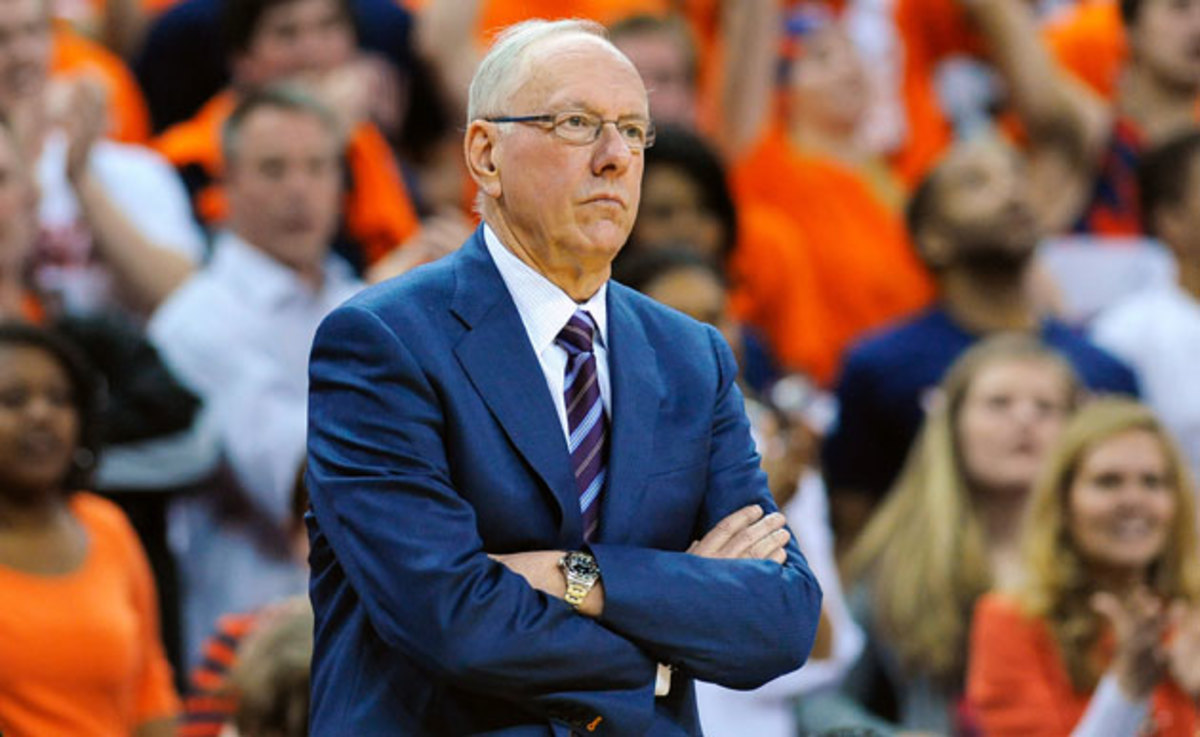NCAA indicts the past, punishes the future, with Syracuse sanctions

Syracuse’s sanctions today were the result of old standbys of college basketball malfeasance: Academic fraud. Cash handouts from a booster just for showing up at a YMCA. A drug policy ignored in favor of another that, based on the athletic director’s depiction, might as well have been drawn up on a Dinosaur BBQ napkin. And then there’s the Hall of Fame coach, found culpable for a program the NCAA deemed out of control, whose reputation and legacy were dampened in a high noon news release.
It was a brutal day for Syracuse. The school could stomp its feet in news releases and talk about appeals, searching for technicalities and hilariously complaining that the Black Sox scandal took less time to resolve. But nothing will entirely reverse the damage of Friday’s news. There is whatever Jim Boeheim’s basketball program had been or seemed to be, and then there is what comes next: The frantic scramble to avoid irrelevance, and maybe that’s the most unsettling part of it all.
Yes, the NCAA came after Boeheim with a nine-game suspension and the failure-to-monitor charge. And it came after athletic director Darryl Gross, revealing his staggering assertion that his department went with an “unwritten” drug policy because the written policy “was confusing.” But most of all the NCAA came after Syracuse’s ability to field an elite basketball program, and it came hard, stripping the Orange of three scholarships per year over a four-year period starting in 2016-17 at the latest. With that handicap, with no flexibility or room for error, the Orange must navigate the unforgiving ACC and build NCAA tournament-worthy résumés.
NCAA: Syracuse's Boeheim suspended 9 games; 12 scholarships lost
This penalty would be problematic in any conference. In the league Syracuse now calls home, it’s crippling.
So, yes, one or two top recruits a year could still sustain the program. Basketball is different that way; a couple players can make a profound difference. It’s just as easy, or easier even, to envision the January and February nights when there are barely enough scholarship players available to muster a rotation, thanks to injuries or transfers. This will be Syracuse’s reality for years.
Already, this postseason will come and go without the Orange anywhere to be seen. They don’t matter this March, no matter how diligently the team continues to play in the face of the school’s self-imposed ban on tournament play. The penalties make it difficult to assure that is the exception. How many more Marches will be as inconsequential as this one? How long can a program drift about in the ACC before it is lost entirely? For a place so abiding in its affection for its team, a place that packs 30,000-plus into a football stadium for two hours of hoops, these are the haunting questions.
From the studs up, Boeheim built something to be reckoned with. What happens if there's nothing much left to reckon with?

The NCAA stripped Syracuse’s coach of more than 100 wins and slapped him with a nine-game suspension, which he will serve during ACC play next year. (His crimes against college athletics were worth 50% of league games, by the infractions committee’s figuring.) In its replies to the ruling, the school was most piqued about Boeheim’s role. It “strongly” disagreed with that, the statement read. “Coach Boeheim may choose to appeal the portions of the decision that impact him personally,” Syracuse’s statement read. “Should he decide to do so, we would support him in this step.”
Asked during a conference call about this stance, the chief hearing officer in the Syracuse case was unmoved. Britton Banowsky, who is also the Conference USA commissioner, pointed out that Boeheim personally hired a director of basketball operations with the intent of improving academic performance. Which that person then did, apparently, by getting players’ email passwords, logging into their accounts and sending messages to professors—posing as the player—and asking what was needed to achieve better grades. That hand-picked Boeheim ops guy also completed coursework, along with a receptionist, to keep a player eligible in 2012, per the NCAA’s findings.
“The rule is pretty clear that the head coach has a duty to monitor activities in a program, and is also presumed to be accountable for violations,” Banowsky said. “The presumption in case was not effectively rebutted at all.”
In the starkest terms, the NCAA laid much of the dismantling of Syracuse basketball at the feet of the man who built it. And to think: Jim Boeheim got off easy. Had the NCAA applied its new penalty scheme to this case, instead of the guidelines that were in place when the violations occurred, Boeheim would have missed at minimum half of the 2015-16 season. This is how egregious—aggravated, to use the NCAA's word—the improprieties were.
The ruling nevertheless hacked away at a legacy. It indicted the past. And yet the real damage, the deepest cuts, are to the program’s future.
Jim Boeheim built something big in college basketball. On Friday, the NCAA ensured that it will be difficult to keep it that way.
